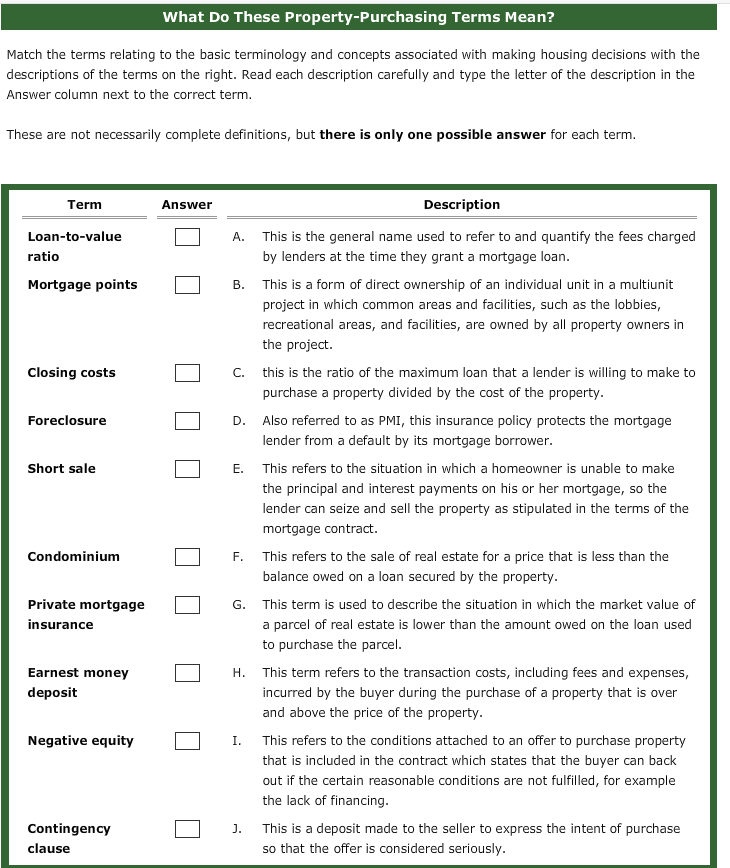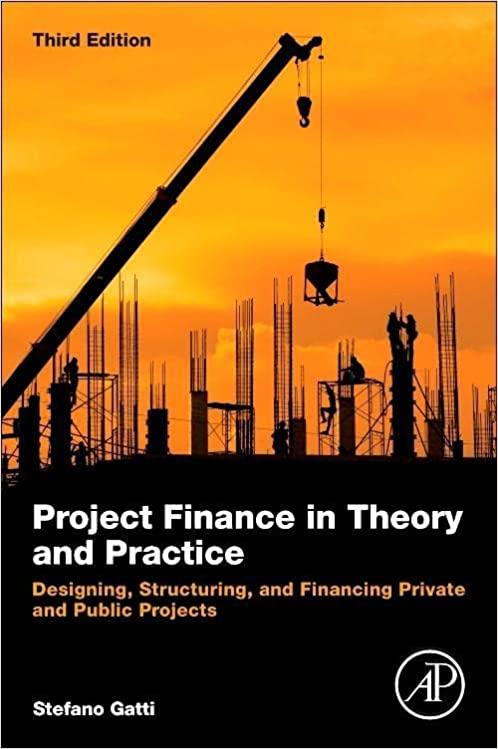
What Do These Property-Purchasing Terms Mean? Match the terms relating to the basic terminology and concepts associated with making housing decisions with the descriptions of the terms on the right. Read each description carefully and type the letter of the description in the Answer column next to the correct term. These are not necessarily complete definitions, but there is only one possible answer for each term. Term Answer Description A. Loan-to-value ratio Mortgage points B. This is the general name used to refer to and quantify the fees charged by lenders at the time they grant a mortgage loan. This is a form of direct ownership of an individual unit in a multiunit project in which common areas and facilities, such as the lobbies, recreational areas, and facilities, are owned by all property owners in the project. Closing costs 0 C. this is the ratio of the maximum loan that a lender is willing to make to purchase a property divided by the cost of the property. Foreclosure 0 D. Also referred to as PMI, this insurance policy protects the mortgage lender from a default by its mortgage borrower. Short sale 0 This refers to the situation in which a homeowner is unable to make the principal and interest payments on his or her mortgage, so the lender can seize and sell the property as stipulated in the terms of the mortgage contract. Condominium 0 F. This refers to the sale of real estate for a price that is less than the balance owed on a loan secured by the property. 0 G. Private mortgage insurance This term is used to describe the situation in which the market value of a parcel of real estate is lower than the amount owed on the loan used to purchase the parcel. 0 H. Earnest money deposit Negative equity 0 I. This term refers to the transaction costs, including fees and expenses, incurred by the buyer during the purchase of a property that is over and above the price of the property. This refers to the conditions attached to an offer to purchase property that is included in the contract which states that the buyer can back out if the certain reasonable conditions are not fulfilled, for example the lack of financing. This is a deposit made to the seller to express the intent of purchase so that the offer is considered seriously. Contingency clause J. What Do These Property-Purchasing Terms Mean? Match the terms relating to the basic terminology and concepts associated with making housing decisions with the descriptions of the terms on the right. Read each description carefully and type the letter of the description in the Answer column next to the correct term. These are not necessarily complete definitions, but there is only one possible answer for each term. Term Answer Description A. Loan-to-value ratio Mortgage points B. This is the general name used to refer to and quantify the fees charged by lenders at the time they grant a mortgage loan. This is a form of direct ownership of an individual unit in a multiunit project in which common areas and facilities, such as the lobbies, recreational areas, and facilities, are owned by all property owners in the project. Closing costs 0 C. this is the ratio of the maximum loan that a lender is willing to make to purchase a property divided by the cost of the property. Foreclosure 0 D. Also referred to as PMI, this insurance policy protects the mortgage lender from a default by its mortgage borrower. Short sale 0 This refers to the situation in which a homeowner is unable to make the principal and interest payments on his or her mortgage, so the lender can seize and sell the property as stipulated in the terms of the mortgage contract. Condominium 0 F. This refers to the sale of real estate for a price that is less than the balance owed on a loan secured by the property. 0 G. Private mortgage insurance This term is used to describe the situation in which the market value of a parcel of real estate is lower than the amount owed on the loan used to purchase the parcel. 0 H. Earnest money deposit Negative equity 0 I. This term refers to the transaction costs, including fees and expenses, incurred by the buyer during the purchase of a property that is over and above the price of the property. This refers to the conditions attached to an offer to purchase property that is included in the contract which states that the buyer can back out if the certain reasonable conditions are not fulfilled, for example the lack of financing. This is a deposit made to the seller to express the intent of purchase so that the offer is considered seriously. Contingency clause J







